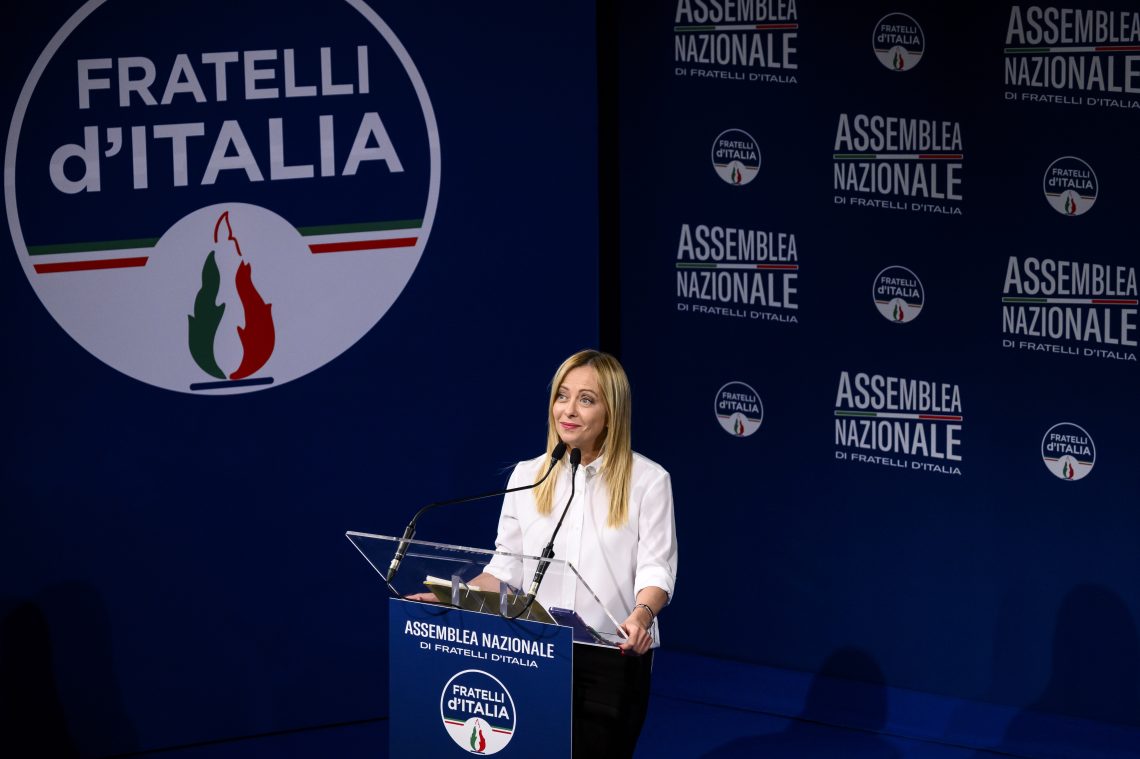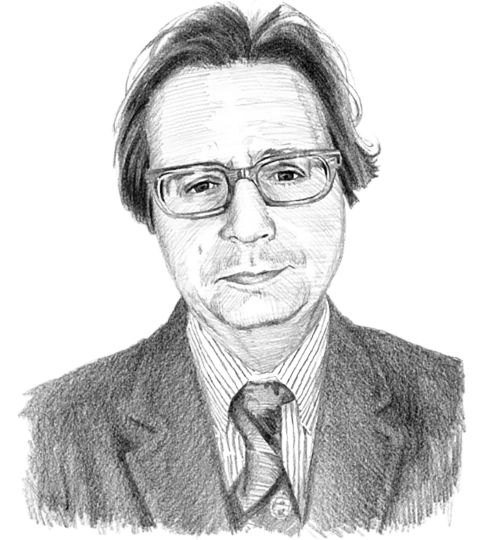The evolution of Giorgia Meloni, from opposition to government
The deft ideological triangulating of Italian Prime Minister Giorgia Meloni since her tenure began should not surprise those who have followed her political career.

In a nutshell
- Giorgia Meloni has been pragmatic as she has risen politically
- She has moved closer to Anglo-Saxon conservatism
- Yet the prime minister has avoided choosing clear priorities
How much has Giorgia Meloni changed since she became the Italian prime minister? Before she assumed office, Ms. Meloni was dreaded abroad, cast as a “European Trumpist” at best. Nearly a year later, she seems to have developed a friendly relationship with American President Joe Biden. Besides Poland, Ms. Meloni has secured Italy as the White House’s strongest European ally, keeping the country where Mario Draghi positioned it.
Ms. Meloni was born in 1977. This simple fact suggests she is unlikely to be the nostalgic of fascism described in the international press. Her account of why she entered politics, and why she joined the party at the far right of the political spectrum, is that it was a reaction to the Mafia killing of prosecutor Paolo Borsellino in 1993, when she was 16. In other words, she was called to politics by a need for law and order. Ms. Meloni does not come from a well-off family, nor a traditional one; her mother was effectively abandoned, along with two daughters, by her husband, a man later implicated in shady businesses in Spain.
Political education
The prime minister’s career has resembled those of old-fashioned politicians. Though she emphasizes her willingness as a young woman to accept simple jobs to make a buck, like babysitting, she quickly found the tenure track of a professional lawmaker. Ms. Meloni went from being a mascot for fellow party members to having a seat in Parliament, becoming vice president of the Chamber of Deputies and then minister in the final Silvio Berlusconi government. As a 31-year-old minister of youth affairs, she was the youngest minister in Italy’s history.
In this formative period, she seemed closer to what is known as destra sociale, the “social right.” This concept identifies a blending of nationalism with corporatism, in the sense of a mixed economy managed by the government (though it claims to operate on behalf of “intermediate bodies,” like trade unions). As such, Ms. Meloni did not follow Gianfranco Fini – her mentor and the secretary of the National Alliance, the party that evolved out of the post-fascist Italian Social Movement – who attempted to rebrand himself as a liberal centrist.
Instead, she remained loyal to Mr. Berlusconi, even as his party and Mr. Fini’s merged – until, with the caretaker government of Mario Monti, she broke off and established a new social-right party. The Brothers of Italy (Fratelli d’Italia, or FdI) was a bold bet, initially seeming doomed to single-digit vote shares. Yet, from the beginning, it was an oddity in Italian politics: the furthest-right party was also the only one led by a woman.
Read more by Alberto Mingardi
The EU’s future: Like Switzerland or more like Italy?
A prudent nationalist
This short summary of a long political history may help explain why Giorgia Meloni was at first seen by many as an extremist. The fact that she was an experienced, career politician was often forgotten. What stuck with foreign journalists was her rhetoric – similar to that of Lega’s (formerly the Northern League’s) Matteo Salvini, though in some sense more sophisticated.
Mr. Salvini made a political fortune out of his hostility to immigration, which he peppered with vague, economic euroskepticism. Yet his insistence that Italy had to quit the euro was never fully shared by his party’s base, which included mostly northern Italian small business owners, rentiers and pensioners – voters who might be culturally conservative, but who also preferred prudence in economic matters. The Lega leader’s once incendiary rhetoric did not prevent him from loyally supporting a government led by Mario Draghi. More tactician than strategist, Mr. Salvini seemed to have little trouble watering down his wine.
In many ways, Italy’s leader is no different than contemporary right-wingers elsewhere in the West, who care more about culture wars than the economy.
Conversely, Ms. Meloni’s defense of Italian borders from immigrants was rooted in a more clearly nationalist understanding of the country’s identity – her taste for law and order seemingly inherent to her political history. On economics, she opposed austerity and supported a more interventionist state, consistent with her cultural roots and with the expectations of her traditional voters, drawn mostly from the south and the public sector. In foreign policy, her party’s history is no stranger to anti-Americanism.
After World War II, the post-fascists could not support Soviet Russia, but neither they were totally aligned with the United States. Later, the “social right” had little sympathy for American culture, which was associated with consumerism and unfettered (by European standards) capitalism. At the same time, right-wingers always admired French General Charles De Gaulle and his geopolitical vision for a Europe independent of the two Cold War blocs.
Election politics
Before the last election, the FdI had never articulated a full-fledged economic agenda. Their sympathies for interventionism were balanced by the need to grow support among the business community. The party was long staffed by political personnel accustomed to vote shares in the single digits, and accordingly did not have many experts within its ranks. This is a problem to keep in mind: the party’s support outgrew its ruling class.
To be sure, this is a group not altogether lacking talent. But since economics was never the party’s forte, its most successful elements tend to come from other domains than the business world. One example is a conservative defense of the “traditional” family, an early Meloni battle cry that has become a sort of personal slogan, following a memorable (or, for her opponents, infamous) speech she gave to Spain’s rightist Vox party. Culture wars have been and remain critical to the prime minister – and particularly the task of reversing Italy’s demographic decline, which the government has tackled mostly by devising subsidies to families with newborns.
In the 2022 election, Ms. Meloni ran knowing she would be leading her coalition’s biggest party, and hence that she would become the prime minister if victorious. Her popularity was boosted by opposition to Covid-19 restrictions. During the race, many detected a metamorphosis: the professional politician trumped the populist campaigner. Ms. Meloni softened her tone, as if anticipating the burden of future responsibilities.

In particular, she took a prudent stance on public finance, keeping campaign promises to a minimum. She also emphasized a shift in her cultural pantheon, one undertaken a few years before. While Ms. Meloni had never mentioned a favorite author – besides references to fantasy writer J.R.R. Tolkien, whose “The Lord of the Rings” has become a reference point for the Italian right as a challenge to the modern world – she began invoking the authority of British philosopher Roger Scruton. She proved she could master English, by participating in a few events held by the National Conservatism movement. She positioned herself at the helm of the European Conservatives and Reformists, a European Parliament party that had included the British Tories.
In a few years, the social rightist actually moved in the Anglo-Saxon direction. This may help to explain her position on the Ukraine war. In part, it is political realism: no Italian prime minister could seriously contemplate putting the country outside the American fold. But it was also partly the result of a personal evolution. Ms. Meloni no longer considered the Americans as culturally different, coming to appreciate the strength of Anglosphere conservatism. Her very usage of the word “conservative” was at first an oddity: Italy never had self-proclaimed conservatives (a term long avoided by the right wing).
Of course, this provoked some uneasiness on the right. A few social rightists have left the FdI to imagine alternative movements, ones remaining loyal to a more anti-American stance. Their potential for electoral success looks limited – but so did Ms. Meloni’s, at first.
Social roots
Yet one should not exaggerate the prime minister’s ideological journey. Roger Scruton, after all, was more a cultural conservative than an economic one, and not altogether skeptical of the use of political power. Ms. Meloni seemed to have moderated her law-and-order attitude by appointing Minister of Justice Carlo Nordio, known for efforts to curb the power of prosecutors and supporting more dovish, rule-of-law principles in the criminal justice system.
On public finance, Ms. Meloni dutifully tapped one of her few genuine experts, Maurizio Leo, to serve as deputy minister of the economy. The chief economy minister post is held by Giancarlo Giorgetti – a Lega moderate rumored to be clashing with party leader Salvini – who presented a fiscally conservative budget law last year. Ms. Meloni has also insisted on reforming the “citizens’ income” introduced by the Five Star Movement, an ostensible poverty subsidy that has been plagued by fraud.
There are growing worries about the state of the Italian economy, which is suffering a contraction of foreign demand.
But other economic choices have been more consistent with her social-right roots than the brand of conservatism offered to international partners. Over the years, the so-called “golden power” – a special government authority to limit or block foreign direct investments and corporate transactions involving Italian assets deemed as strategic – has been applied more widely. Ms. Meloni did not stop the trend but has reinforced it. She mimicked a tax implemented in Spain by socialist leader Pedro Sanchez on banking “windfall profits,” portrayed as retaliation against banks’ delay in increasing account interest rates after the European Central Bank raised rates.
She has also scrutinized the use of flight-pricing algorithms by airlines and banned their use for internal flights between the Italian mainland and Sicily and Sardinia, declaring a sort of war on the law of supply and demand. The premier renationalized Italy’s telecom grid, having the economy ministry invest in it together with the American fund KKR. As the left pressed the case to introduce a legal minimum wage – which Italy currently lacks due to deeply rooted collective agreements between trade unions and business associations – Ms. Meloni has appeared eager to implement some version of that proposal.
Scenarios
In many ways, Italy’s leader is no different than contemporary right-wingers elsewhere in the West, who care more about culture wars than the economy. Her friendship with the U.S. comes at a moment when America is hardly a champion of free markets, either internally or internationally.
Yet Italy has problems not shared by most Western countries: a public debt around one and a half times the national gross domestic product; an urgent need to remain credible in the eyes of international investors; and 20 years of economic stagnation due to the lack of productivity growth. Are these challenges one can tackle with an interventionist agenda, which maximizes the government’s discretionary power and prizes it over the country’s international credibility?
How does Giorgia Meloni want to be remembered? She is a seasoned politician, enough to know that a head of government cannot make her mark on more than a handful of issues. Any prime minister has enough political capital for one, perhaps two major reforms. She has no real opponent for the moment, with the Italian left in shambles. But four years from now, what does she imagine she can claim before the voters? The list of potential reforms is endless: the tax system, the judiciary, education, welfare, regulations and more. Which is she eager to seize?
That, nobody knows. In fashioning herself as a latecomer to moderation, Ms. Meloni has avoided offering a clear set of priorities. In her speeches, old and new, she is full of love for her “nation” – a term she prefers to “country.” What is she planning to bequeath the nation, to make it flourish in the future?
There are growing worries about the state of the Italian economy, which is suffering a contraction of foreign demand. The government has taken a strong stance against the European Central Bank, which it has repeatedly accused of excesses in rising rates. At the same time, inflation is now felt by the average Italian shopping for her groceries. It is a difficult situation calling for prudence in the short run but also for clarity of thought in the longer term. Now, the Meloni government seems too busy, eager to spend more as European elections fast approach.
For the coming race, Ms. Meloni had seemed eager to bet on the unthinkable: a European-wide coalition with the European People’s Party conservatives. That scenario would have made her a godmother of the European right, but it is increasingly unlikely.
Her coalition is strong, and her opponents lack a credible alternative; but politics change quickly, particularly in Italy. What if Ms. Meloni puts together a budget law that is deemed not credible by the debt markets, and then loses consensus during the next European elections? How strong will her government remain? Can she be trusted to be at the helm if a new financial tempest arrives?
Ms. Meloni was smart not to show too many of her cards in her first months in office. She knew she needed to be reactive, not proactive. But as more time passes, the more likely it is that, at least within her coalition, the balance may shift slightly in favor of her allies. If her government is perceived as inconclusive, she and not Matteo Salvini will bear responsibility for voters.
How she will manage this risk is uncertain. While the changes in her rhetoric have been plain to see, what Giorgia Meloni really wants – besides being in charge – remains a mystery.









